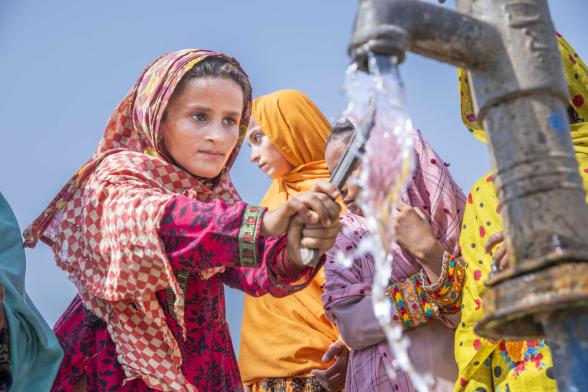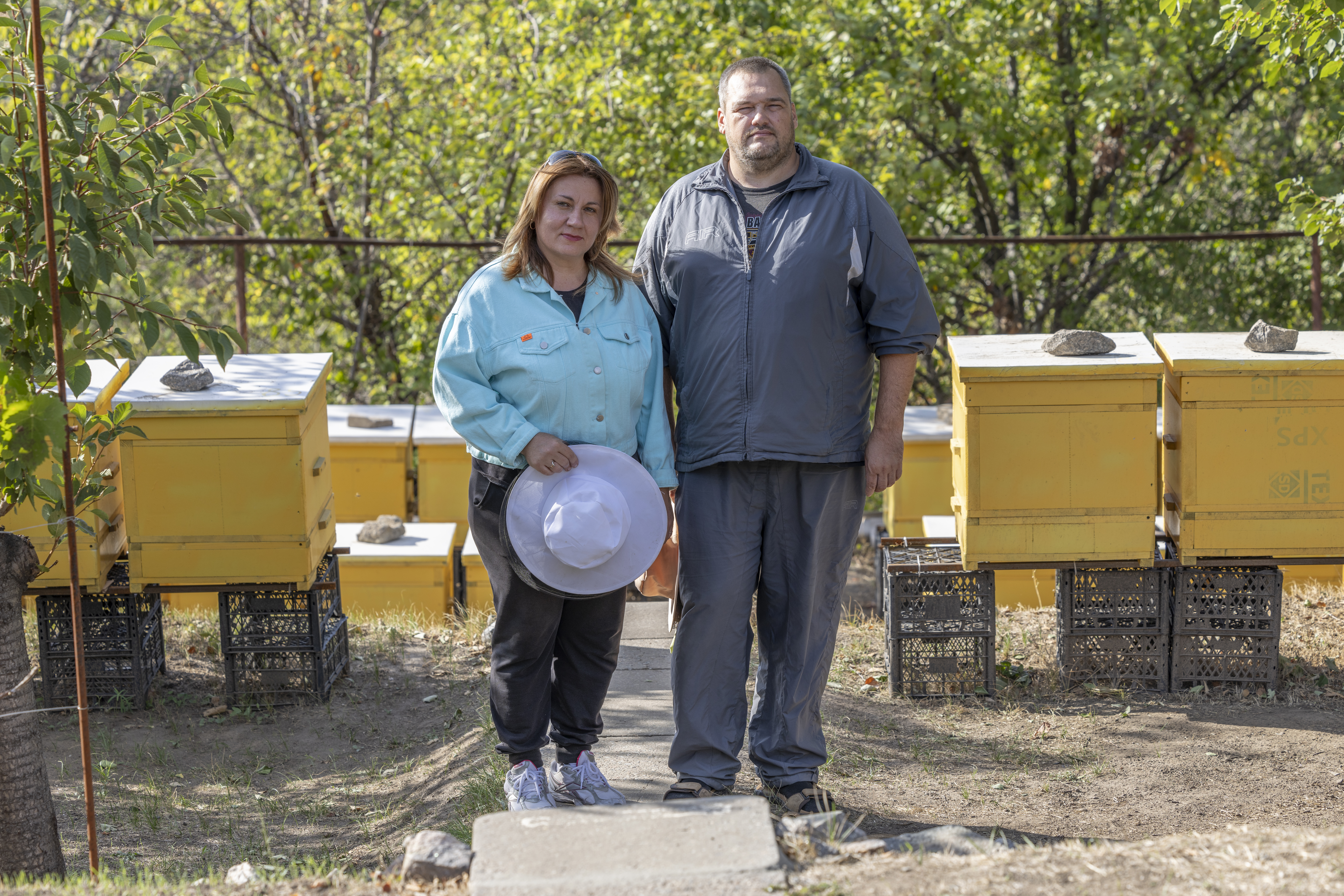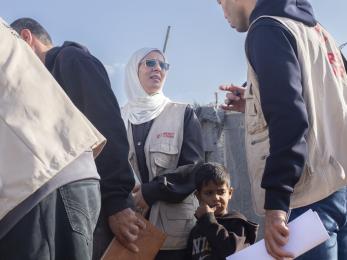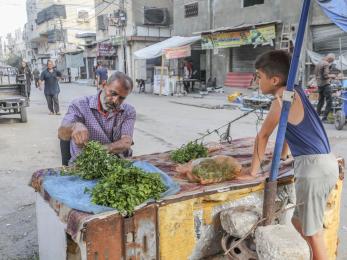“Unprecedented need”: Mercy Corps forges ahead amid foreign aid cuts
Tjada D’Oyen McKenna appears on “Masters of Scale: Rapid Response” podcast
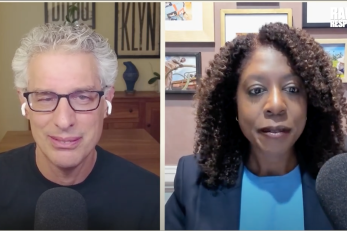
When foreign aid was cut earlier this year, Mercy Corps teams saw the impact immediately—more than half of our U.S. grant-funded programs came to an abrupt end. For decades, U.S. foreign aid has been a lifeline for millions around the world. After sweeping funding cuts, humanitarian agencies are being forced to do more with far less.
“We have to completely reimagine and try to do the same if not more, with less resources into the system,” said Mercy Corps CEO Tjada D’Oyen McKenna, who was featured on “Masters of Scale: Rapid Response” podcast with host Bob Safian.
“We still will have funding to do some of the things that we always did,” said Tjada. “But there’s also this opportunity for all of us to reinvent ourselves while we make the case again to remind people why this work was critical.” Mercy Corps is finding new ways to sustain our work, forging partnerships and innovations to continue reaching communities in crisis. The conversation offers a candid look at what it means to lead through adversity and remain hopeful amid unprecedented need.
Transcript excerpt from “Masters of Scale: Rapid Response” episode: “After devastating aid cuts, Mercy Corps keeps fighting”
Tjada D’Oyen McKenna: There’s this unprecedented need in the world right now. 300 million people across 70 countries who classify as being in need of humanitarian assistance. That number is more than double what it was six years ago. The original set of executive orders telling us to halt work happened on a Friday afternoon, so it was right after inauguration. We are not going to get back to the size we were in terms of dollars, but how do we still maintain an impact level? There’s this opportunity for all of us to reinvent ourselves while we make the case again, to remind people why this work was critical.
Bob Safian: That’s Tjada McKenna, CEO of Mercy Corps, which provides aid relief in the world’s most perilous places to the world’s most at-risk people. Two-thirds of Mercy Corps programs have been rescinded this year due to Trump administration aid cuts. Tjada has been under intense pressure, scrambling to find new ways to help those in need, even as she resorts to layoffs to keep Mercy Corps afloat. She’s leading a team of aid workers in Gaza who are literally starving on the ground. Yet as she puts it, she isn’t running away from burnout, but embracing the stress. For an organization built around responding to crises elsewhere, Mercy Corps now is at the center of its own trauma.
Tjada’s efforts and candor provide insights and lessons for all of us. So let’s get to it. I’m Bob Safian and this is Rapid Response.
Bob: I’m Bob Safian. I’m here with Tjada McKenna, the CEO of Mercy Corps. Tjada, welcome back to the show.
Tjada: Thank you for having me.
Bob: It has been quite a challenging year for humanitarian organizations like yours. I want to first take you back for a moment to when the Trump administration announced it was stripping USAID, pulling back a ton of U.S. foreign aid. Where were you when you heard about that? What were you sort of feeling when that happened?
Tjada: The original set of executive orders telling us to halt work happened on a Friday afternoon. So it was right after inauguration. I happened to be meeting with a board member. We had lunch in DC right next to the White House, and I was getting in my car to come home, and I realized I had eight or nine missed calls, and everything was blowing up, and it was my team saying, “We’re supposed to stop everything. We have to halt everything.” And it was just kind of shock and disbelief really, because I couldn’t even begin to comprehend how to do that or how to tell people to do that.
Bob: U.S. government funding accounted for half of your funding, right?
Tjada: Exactly.
Bob: About two-thirds of your programs were rescinded. I mean, it’s like an existential crisis, a true existential crisis for the organization. So what did you do? I mean, you faced a slew of urgent decisions.
Tjada: They were urgent decisions, and I have to say it was very clumsy, right? Usually when you work with the government, there are definitions for every single thing, so very specific definition for stop or very specific definition for freeze. And in this case, the guidance wasn’t there. When they said we had to stop doing everything, our first concern was safety for people. If I have people in a remote area of a country or in charge of delivering food to a school feeding program next day, that community didn’t understand that we weren’t showing up the next day, and they certainly didn’t understand it was because the U.S. government told us not to, but we had to go to work.
Once it was clear what was going to be cut or what wasn’t going to be cut, we had to go about shutting down those programs across 40 different countries, lots of different labor laws to that. We consolidated some of our regions, we closed some country offices. We just got to work to say, “If the funding wasn’t there for that program, we’ll shut it down in the most responsible way possible and we’ll keep moving and then address what we have to do with the U.S. government to see what we can preserve, make sure our other funders are okay, and still be prepared in case if another hurricane or earthquake had hit during that period, we still had to be prepared to respond.”
Bob: I mean, the irony is your organization is all about responding to crisis when it emerges, and now the crisis becomes you. And in some ways in some of these communities you’re sort of creating the crisis because they’ve become used to having you there.
Tjada: Yes, yes, yes. And I worried a lot about staff safety, particularly in remote places where we were a source of survival for people where we provided access to food, and that continued to plague me. We’d hear reports from colleagues of government officials trying to stop their country director to make sure everyone got paid before they left. And my staff in Sudan, almost all of them are displaced from their homes themselves. So they’re working for us in temporary shelters, still going through the same problems that everyone else is going through.
And so this was a weird situation where our organization was the one that had to be the emergency patient, but we also knew… You almost felt guilty for feeling bad because people have it so much worse than you do. There were a lot of weird mental gymnastics that were happening for all of us.
Bob: We’re now months in, past that initial shock. How much do you look at 2025 today as an inflection point, sort of a new normal for USAID orgs like Mercy Corps? Are you kind of holding your breath in a way in hopes that, “A next administration maybe will reinstate things?”
Tjada: No, we know nothing’s going back to the way it was, but we don’t know exactly what that looks like going forward. The other thing that was surreal is there was this demonization of aid or demonization of aid agencies. A lot of misinformation about the work we were doing and how we were doing it. And then there’s the third and fourth effect. So in a lot of places, we rely on UN airplanes to get in and out of certain areas, and so a lot of UN organizations were also facing the same U.S. cuts that we were. So we are still digging out of the aftermath. We know the world is fundamentally changed, and right now we are trying to embrace that and move into the future while also knowing the future’s still quite uncertain.
Bob: I mean, there’ve been assertions about the human impact of these USAID cuts, and they’ve ranged from millions of lives lost to no direct lives lost per some in the administration. For Mercy Corps, in your own specific work, can you calculate the on-the-ground impact?
Tjada: So country by country, we can tell you what we are no longer able to do, and I shudder to think about what the worst cases for some of those people are. So for instance, in Nigeria, we were providing 12,000 pregnant women and 55,000 children with healthcare and nutrition. That was gone the next day. In Democratic Republic of Congo, we had safe water programs. So now 162,000 people don’t have access to that water for their sanitation needs for food, for just basic daily living. In Somalia, we have about 2 million children that we were serving meals and malnutrition products. We haven’t had those, and there definitely have been lives lost. Those numbers are real, but we just hope for the best.
Bob: And I guess you hope that someone or something else steps in to help fill some of those gaps, but you don’t really have any control over that.
Tjada: No, and the U.S. government was providing 40% of the funding for humanitarian aid globally worldwide. The entire value chain for malnutrition treatment was really reliant on a few different U.S. government contracts that we didn’t know that value chain was falling apart until it fell apart. So it was more than just funding of specific programs. It really is a whole architecture and a system that has been impacted at once. And I think that’s why some of the after effects are still not as clear. There are no other governments that can pick this up. All the other governments combined aren’t the size to pick it up. We have to completely reimagine and try to do the same if not more, with less resources into the system.
Bob: Some aid organizations sort of hope, maybe a high net worth individual, some rich billionaire or foundation will sort of step in and fill the funding gaps. Have you seen any of that? How realistic is that?
Tjada: Nothing is going to fill the gap entirely of what was lost. And I think that’s what we’ve all had to come to terms with. We have been very fortunate where we’ve had generous supporters or foundations that have supported us, try to provide extra funding or surge. But the reality is I think foundations and corporations rightfully and individuals rightfully don’t want to see themselves as filling roles that they see government should be filling themselves. While they’ve helped on the margins, I think they are largely sticking to their strategies.
Bob: I heard you got some anonymous donations and even your own workforce sort of stepped up.
Tjada: We had employees that wanted to donate to keep programs going. There’s a project called Project Resource Optimization, which is a bunch of scrappy former USAID employees who looked across everything that was canceled and identified the ones that were the most efficient and effective and then proceeded to try to match funders to those. So we just learned in the last week or two that we have a water and sanitation project in Nigeria we’re able to turn on. We were able to turn back on a nearly complete water and sanitation project in Afghanistan thanks to an individual donor.
Bob: Have any brands stepped up with new support, or is it kind of the opposite that companies are more wary and holding back because they’re maybe worried about what the administration is going to say?
Tjada: I was really worried about companies wanting to hold back and not wanting to be affiliated with giving, especially for overseas causes. And those worries have not come to fruition. I think our corporate partners, they still know the value of the work. Some of them are still in these markets where we work. Others just see it as their corporate responsibility. And so they’ve hung in there and continued to increase or do new grants. Now, they might be more lower key. I don’t know that any of them are doing Super Bowl ads, then work with us, but they’ve been wonderful partners.
The other piece is their employees also care and stepped up giving because they want… The U.S., we’ve always been a very charitable nation in a lot of ways, and I think a lot of employees wanted to demonstrate that and continue it and look to their companies to show that they were still doing those things.
Bob: You also mentioned that you’re in a position where you have to do more with less. Do you have to also reduce your ambition for what you can do, and how do you make those determinations?
Tjada: So there’s this unprecedented need in the world right now. So right now there are 300 million people across 70 countries who classify as being in need of humanitarian assistance. That number is more than double what it was six years ago. We have two actively declared famines going on in the world at the same time. That just doesn’t happen in Gaza and Sudan and lots of conflicts. The need in the world is not going away. We are not going to get back to the size we were in terms of dollars, but how do we still maintain an impact level and quantify that? What can we do more efficiently?
So in situations where we were direct implementers before and had a large team, are there ways that we can accelerate work with local partners for them to take over pieces of it or ways to still get support to people through remote ways, or can we accelerate some government transfer? So really trying to figure out what that next wave of impact looks like. We still will have funding to do some of the things that we always did, but there’s also this opportunity for all of us to reinvent ourselves while we make the case again to remind people why this work was critical.
Bob: It must be hard not to sort of want to go back to doing the things that you knew were working and now you can’t. I mean, it must be hard. It must be frustrating.
Tjada: It’s weird. Our employees are at different stages of the grief curve, right? Everyone’s experienced this differently. And as the CEO, I’m furthest ahead because I’ve seen what’s come across. People talk a lot about a fight or flight instinct, but there’s a third dimension of freeze and just do what you always did or just hold still. And what I’ve said to the team is that’s just absolutely not an option. That’s an option to just go away and to die a slow, quiet death. You can’t do nothing. We’ve got to just radically rethink everything. And the way I’ve talked about it to my team is that we’re testing out different pathways.
Read the full transcript here.
